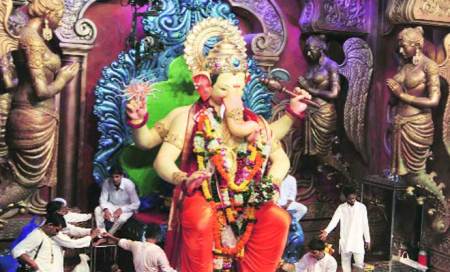 Peru looks forward to auspicious days when devotees throng the temple. Express
Peru looks forward to auspicious days when devotees throng the temple. Express
Temples across the country are known to give livelihoods to different kinds of people living around them. While some households are run from the proceeds of prasad sale, many families depend on the shops selling puja material. And then, there are some who make a living guarding shoes of the devotees as they pray inside, barefoot.
Peru is one such man. “It’s not my real name but that’s what everyone here calls me,” he says. The shoe-keeper watches over the shoes of devotees outside a temple in South Mumbai. In return, he gets paid a sum, with which, says Peru, he just about makes ends meet.
Seated on a plastic chair next to a rickety, iron shoe stand, Peru looks forward to auspicious days when devotees throng the temple and the shoe stand is filled up. Around his chair, there are pairs of leather chappals, rubber slippers, sneakers, high-heel ones and children’s shoes.
For watching each pair, devotees who go to the outer premises of the temple pay him Rs 2. But that too is hard to come by sometimes, says Peru. He charges Rs 30 and hands over a token to devotees going to the inner altar of the temple. He returns the shoes only upon getting the token back. But when none of the rules are in black and white, neither is the policy on loss. If shoes get stolen or lost, Peru stands to lose a large chunk of his modest earnings.
“Last week someone had kept shoes worth Rs 10,000, but they got stolen. I had to pay him Rs 5,000, even though it was not my fault,” says a distressed Peru.
With none to back him up, the 38-year-old avoids washroom or snack breaks. “I sit here from 7 am to 8:30 pm every day. If I am lucky, I make around Rs 400 a day, sometimes I make as little as Rs 90,” he laments. Peru eats at roadside stalls, vada pav and tea being a standard meal. Working every day of the week is just enough to feed himself, leaving him with “no savings”. He sleeps on the road or in a friend’s taxi.
Peru says he left his village in Uttar Pradesh at 16 and came to Mumbai to make a living. Not everything, he says, has gone according to plan. “I lost my parents when I was young and I did not get along with my relatives,” he recalls. Peru did various odd jobs over the years and has lived across the city. “I sometimes slept in catering halls, or worked in Kurla bus depot so that I could get a place to sleep. Life is tough,” he says.
Struggling to make ends meet in the city of dreams, Peru nurses a dream of his own. “I want to go back home to my village and get married, but cannot until I earn enough money first,” he says.






